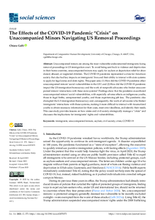Abstract:
Unaccompanied minors are among the most vulnerable undocumented immigrants facing removal proceedings in U.S. immigration court. To avoid being sent back to violence and deprivation in their home countries, unaccompanied minors may apply for asylum or deportation relief for abandoned, abused, or neglected children. The COVID-19 pandemic represented a crisis for American society that also had key impacts on immigrants’ lives and their ability to interact with state systems to apply for legal status and claim rights. This paper asks:
(1) How did the COVID-19 pandemic affect unaccompanied minors’ social vulnerabilities in the US?; and
(2) How did the COVID-19 pandemic impact the US immigration bureaucracy and the work of nonprofit advocates who broker unaccompanied minors’ interactions with these state systems?
Findings show that the pandemic exacerbated unaccompanied minors’ social vulnerabilities, with especially adverse effects on indigenous youths, those in legal limbo, unrepresented youths, and those experiencing job loss. The pandemic also disrupted the US immigration bureaucracy and, consequently, the work of advocates who broker immigrants’ interactions with these systems, making it more difficult to interact with traumatized youths to obtain necessary information for their cases, meet strict deadlines, and identify their needs.
This case study provides lessons on how states and civil society strategically manage a “crisis” and discusses the implications for immigrants’ rights and vulnerabilities.

